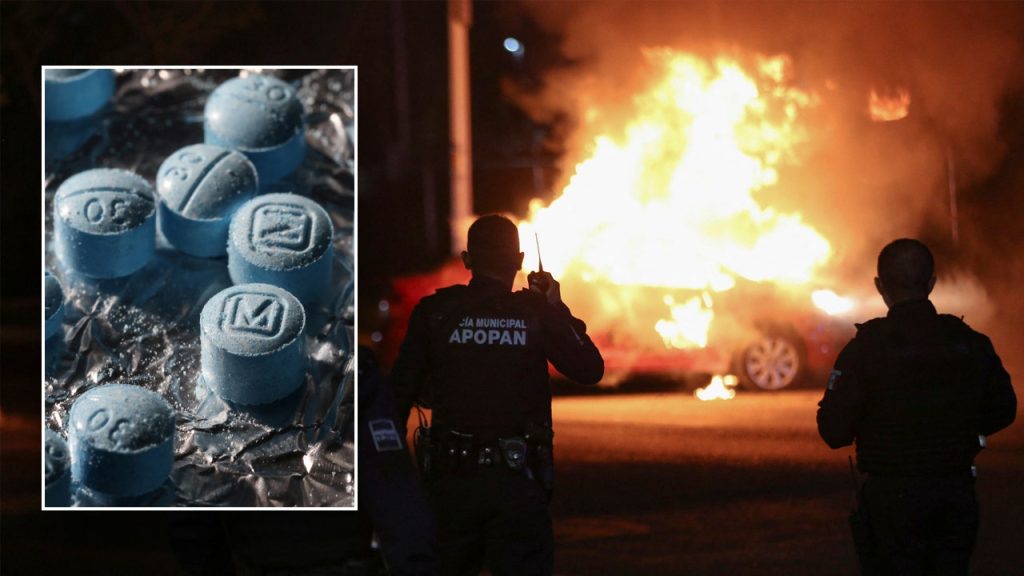The Treasury Department is expected to announce sanctions against individuals and entities linked to a violent Mexico-based drug trafficking cartel responsible for trafficking fentanyl and other deadly drugs into the United States. The sanctions are set to target nine Mexican nationals and 26 Mexico-based entities linked to a fuel theft network that generates millions of dollars for the cartel Jalisco Nueva Generacion. The move to sanction was coordinated with the Drug Enforcement Administration (DEA) and Mexico’s government, with U.S. officials working with Mexico’s financial intelligence unit. Deputy Treasury Secretary Wally Adeyemo stated that the Biden administration is committed to disrupting the funding and operations of deadly fentanyl-trafficking cartels like CJNG, as their diverse revenue streams, including fuel theft, strengthen their ability to traffic fentanyl into the U.S.
The DEA has reported that Mexican drug trafficking cartels like Jalisco Nueva Generacion and Sinaloa have flooded major U.S. cities with meth and fentanyl, using violence to protect their turf. These cartels have caused what the DEA describes as the worst drug crisis in U.S. history, effectively eliminating competition in U.S. markets and dictating the flow of nearly all illicit drugs into the country. Thousands of cartel-linked dealers operate within the U.S., with recent busts leading to the sentencing of traffickers tied to the Jalisco cartel for coordinating large shipments of methamphetamine. Fentanyl, which can be fatal even in small doses, has caused the deaths of over 70,000 Americans per year, produced primarily in Mexico and shipped across the U.S. land border by cartels using Chinese precursors.
Last year, the Treasury Department sanctioned members of the Sinaloa cartel, furthering efforts to target drug trafficking gangs and keep drugs like fentanyl off the streets. Earlier this year, the DEA highlighted the crisis caused by the Sinaloa and Jalisco cartels, noting their widespread presence in U.S. markets and their role in flooding the country with meth and fentanyl. In response, the Biden administration has launched a global coalition to address the threat of fentanyl, including cooperation with countries like Mexico to crack down on smugglers and regulate precursor chemicals. Additionally, Treasury Secretary Janet Yellen launched the Counter-Fentanyl Strike Force last year and announced an exchange with China to enhance cooperation in combatting money laundering related to drug trafficking and other crime.
In late April, 12 traffickers tied to the Jalisco cartel were sentenced to federal prison for coordinating a shipment of nearly 200 kilograms of liquid methamphetamine worth $9.9 million. The investigation resulted in the seizure of 650 kilograms of methamphetamine, along with guns, cash, and property. Fentanyl, often cut into other drugs or made into counterfeit pills, poses a significant risk to users who may not realize what they are ingesting. The drug’s production in Mexico by cartels using Chinese precursors highlights the international nature of the fentanyl trade and the need for coordinated efforts to combat it. With the announcement of sanctions targeting individuals and entities linked to the CJNG cartel, the Treasury Department continues its crackdown on drug trafficking gangs to make communities safer and prevent the spread of deadly drugs in the U.S.
The Biden administration’s efforts to disrupt the operations of fentanyl-trafficking cartels like CJNG underscore its commitment to addressing the ongoing crisis caused by the influx of drugs like fentanyl and methamphetamine into the United States. By coordinating with agencies like the DEA and Mexico’s government, the administration aims to strengthen international cooperation in combatting drug trafficking and keeping dangerous substances off the streets. The sanctions announced by the Treasury Department target individuals and entities linked to the CJNG cartel, focusing on disrupting the funding sources that enable the trafficking of fentanyl and other deadly drugs. This coordinated approach reflects the administration’s recognition of the urgent need to address the impact of drug cartels on communities in the U.S. and beyond, highlighting the importance of continued efforts to combat the flow of illicit drugs across borders.


